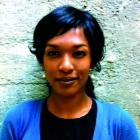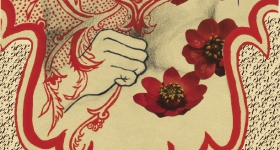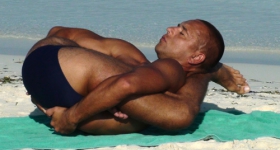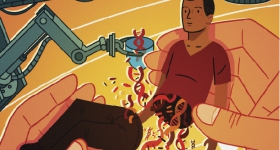Writer Dharushana Muthulingam
"Give the placenta to the med student."
I was handed a bowl of blood and jelly and told to examine it.
While the resident grimly sewed vaginal lacerations amid the indiscernible sea of bleeding flesh, the patient was glowing, thanks to a well-placed spinal epidural, post-labor oxytocin and a ridiculously adorable, slimy new baby. I turned back to my bowl.
Placentas are the weirdest things I have ever seen. They are amorphous blobs with veins that systematically course through them. My job is: 1. ensure the whole thing is out, so the patient does not get a nasty infection 2. correctly identify the blood vessels in the cord so the attending physician can grade me.
It is a little after 4 a.m., and I am listlessly rooting through the still warm, quickly cooling organ that complies like an especially ropey, dying jellyfish. The smell is the coppery acrid smell of blood, amid the heavy odors of sweat. All the lobes are intact. We unceremoniously dump it in the correct biohazard bin.
For this tremendous privilege, of course, I had spent years dissecting pickled cadavers, memorizing drug interactions, doodling out the arrows of biochemical reaction. And for that privilege I dutifully slogged through chemistry, biology, eye-stabbing loads of standardized testing. And in turn, I took my AP classes, performed my math drills, etc. Take one part South Asian American daughter, one part California public school system, a couple of Pell Grants and wham! Medical student.
Here's the thing. Don’t tell. I like medicine. I love it. I love bearing witness to birth, death and strength. I love figuring out puzzles and knowing what to do in a crisis. And I love tenderly examining placenta at 4 a.m. Not as much as sleep, but it’s not a bad alternative.
I was a closeted premed for two years. Before that I was defiant. OMG another Sri Lankan doctor! That’s silly. I would be a philosopher. Or maybe an astrophysicist. Something real. Not the tin-hat model minority doctor/engineer/accountant. No way!
At 5:30 a.m., I begin to examine my patients on the labor and delivery floor. As the third-year medical student, I am my intern's shadow. But I pretend these ladies are mine. I rehearse my bad Spanish; warm my stethoscope before I place it against their chest; press through swollen bellies; carefully remove surgical staples. New families curl together in hospital beds. I am accepted and invited into this strange intimacy. I am enthralled.
Why not? Why not medicine? My father is not a doctor. My mother is not a doctor. They want me to be a doctor. Because then they will have Done Well, launching their daughter on a whooshing trajectory into the American Middle Class. Also, this was their retirement plan.
But no way! I was Too Cool. And by cool, I mean a nerdy, angsty freshman at Berkeley, swept and devoured by the rhetoric of a New Consciousness. I wanted to be Revolutionary, a Bohemian, a Renaissance Woman. I majored in philosophy and learned modern dance. I wandered aimlessly through Morocco, Ecuador, China, staring morosely from cafes. It was still a variation on the privileged, educated American life, just one that my parents found to be terribly confusing.
Why did I want to be a physician? Here is the application version: I love science, I want to help people. I am good at color-coding my notes.
Here is the cocktail party version: I love body fluids. I want to skewer biostatistical methods and pharmaceutical backdoor deals. I can support my philosophy habit. I know everywhere people bleed and birth and run out of their insulin. I am needed. I am curious.
Here is the version that is drunk on my own ferocious idealism: I am the one handling your blood and your urine, and I am the one who knows how many abortions really happen, how much depression there really is, how much the upstanding rich and middle class really beat their children and their wives. If I know all this, then I have power. Because if I am a doctor, people will listen to me. If people will listen to me, I can tell the congressman the vastly increased rates of diabetes, hypertension, heart attacks and strokes in communities of color. The devastation of neighborhood violence on young men who leave the hospital bound in wheelchairs and colostomy bags, if they leave at all. I can write the angry letters on world trade policies and the price of grain, the effect of food security on refugee populations, on access to patented HIV medication. I can blur that fanciful line that people draw between the mental illness and drug addiction of the wealthy and the mad junkies they pity on the street. Under the cold clinical light, bodies become the same fragile theater of triumph and suffering. If people will listen to me, if I have power, could I not share this compassion? Couldn't I transform that rage at injustice — rage for all those who also feel left out and suffer for it, the rage of impotence — couldn't I make it right?
Here is the version where I am alone: If I am a doctor, I will listen to others, and others will listen to me. If I am a doctor, I will be tough in the face of suffering. I will have earned my place, my parents will hear me.
At 7:30 a.m., our rounds are interrupted by an emergency cesarean section. The team is tense. A slowing fetal heartbeat could mean a number of benign or terrible things. Most of the terrible things result in the infant's cerebral palsy. In the OR, very quickly: Anesthesiologists are numbing and paralyzing, the surgeons ritualizing and gowning, the nurse is arranging the metal prongs, blades and sutures. The patient is bewildered but trusting. We try to shout explanations, but no one on the team today speaks Mandarin.
An emergency cesarean is a violent affair. We tear into the young woman’s body, and deep within her, we find him, a small, blue, perfectly shaped thing, tangled in his own cord. The surgeon scoops him out and cheerfully shouts "Happy Birthday!" before tossin' the creature to the waiting pediatric team. We take to reconstructing the woman.
I am up to my elbows in the abdominal cavity of another human. She is warm and slimy and magnificent. In three days, I will remove her staples and be amazed when this will be only a neat line stitching itself together, and she will have learned to breastfeed her new son. I will remember: Aristotle; the mechanisms of antibiotic resistance; my illiterate grandmother, the village midwife.
Here is a final version: If I am a doctor, I am.
Dharushana Muthulingam is a student in the UC Berkeley-UCSF Joint Medical Program. She blogs at oslersbeast.wordpress.com.










Comments